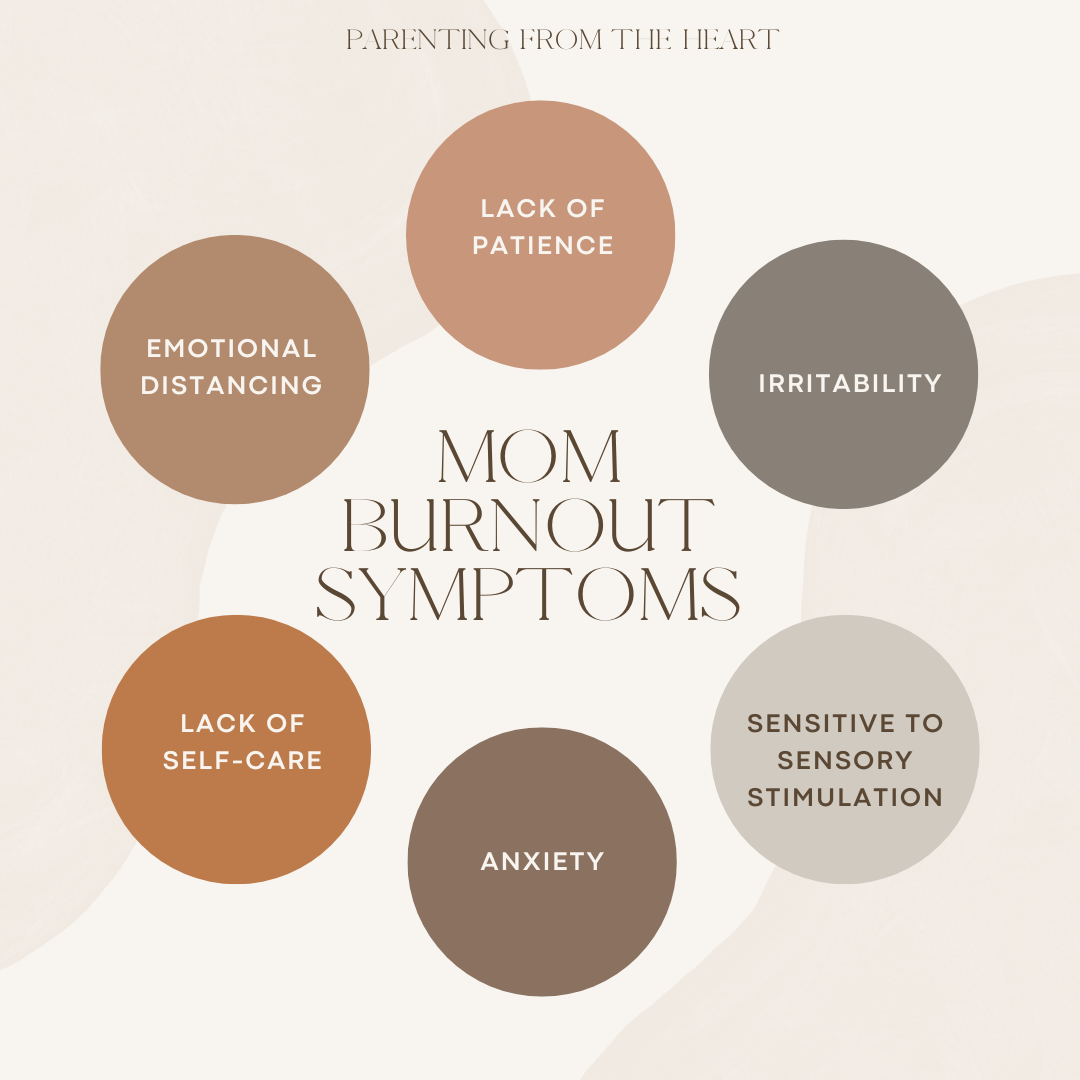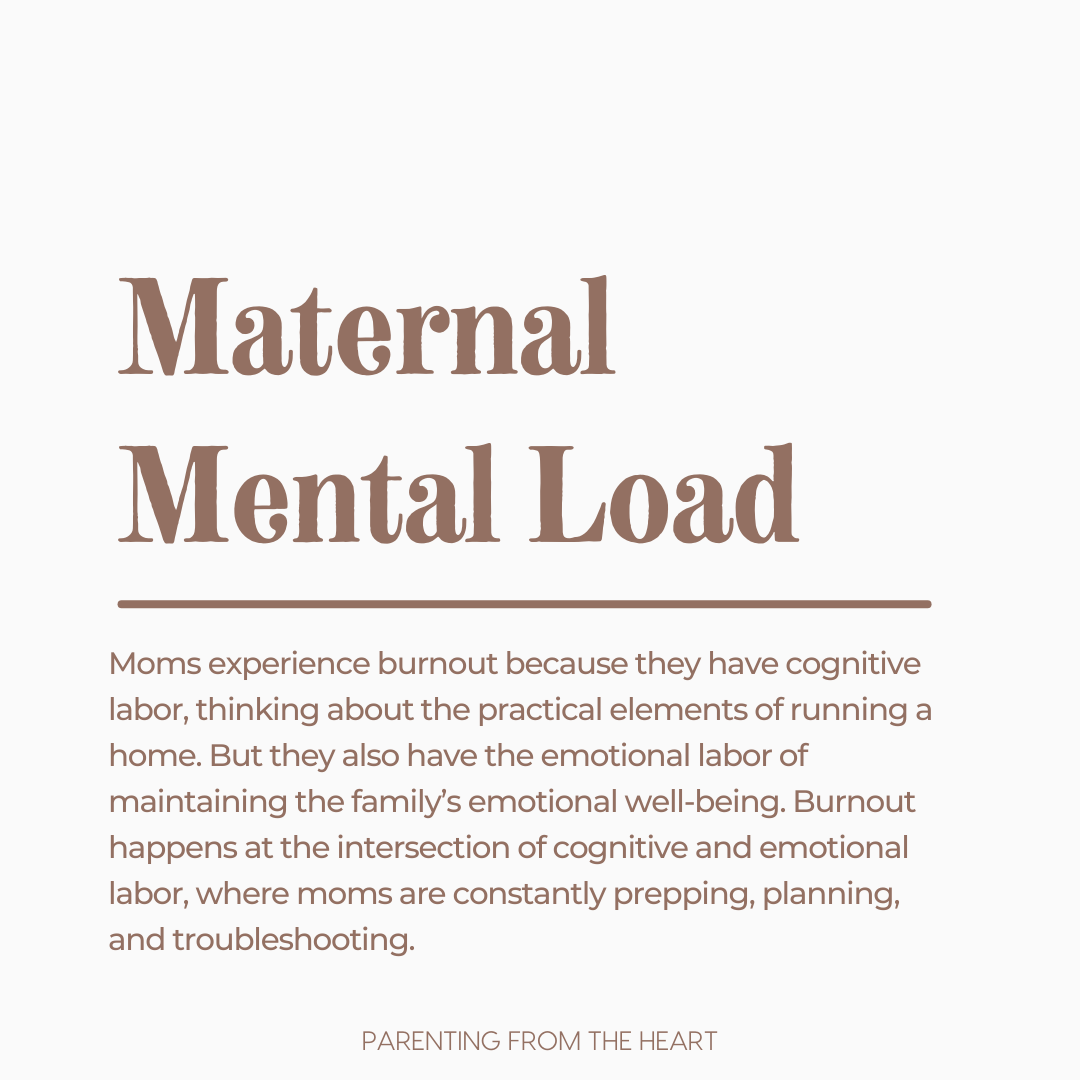Table of Contents
Mom burnout got the better of me, and man, was I tired.
Not just tired from a lack of sleep but the kind of tiredness that makes you numb. As I stood at the counter cutting vegetables I knew my kids wouldn’t eat (while I mentally planned a backup meal). I could hear the constant beeping of a toy car and the sounds of escalating conflict coming from the living room. As two screaming kids ran into the kitchen, I could feel my anxiety rising. It was just a sibling squabble. I should be able to handle that, right? Wrong! As my sons got more heated, one launched the still-beeping car into my face. I chose violence that day. I screamed at my kids. I threw the carrots I had been cutting. I scared them.
I remember sitting outside on the lawn crying as my boys watched with terrified eyes from the window. This was not the motherhood journey I signed up for. I was guilty and ashamed when I watched my kids flinch as I went to hug them and apologize. I was at my breaking point, and I realized that mom burnout was a real thing. I was living in a constant state of hyperarousal that left me emotional, aggressive, and, even worse, apathetic. When I looked at my kids that day, I knew something needed to change for my sake and theirs.
What Is Mom Burnout?
Mom burnout is physical, mental, and emotional exhaustion that many mothers experience as they try to be everything for everyone. Mommy burnout is persistent and pervasive and affects how moms go about their daily lives.
I had many mom burnout symptoms, and ignoring them led to my spectacular meltdown. My situation was extreme because I had reached my breaking point. But in the lead-up to that moment, I was reactive with my kids, quick to yell, and often became touched-out. Recognizing symptoms of mommy burnout can help you avoid a situation like mine.
Mom Burnout Symptoms

Burnout can look different for everyone, but there are a few common warning signs.
- Tiredness
- Feeling overwhelmed
- Irritability
- Anxiety
- Reactivity
- Lack of patience
- Disrupted sleep
- Emotional distancing
- Lack of self-care
- Sensitive to sensory stimulation
Depleted Mother Syndrome (DMS)

Mommy burnout is also known as Depleted Mother Syndrome. Research has found that the prevalence of DMS varies dramatically across the world, with individualistic cultures having a much higher rate of burnt-out moms. Individualistic cultures value independence, autonomy, and self-reliance, and that go-it-alone philosophy carries over into motherhood.
Being burnt out is more than just feeling tired and overwhelmed. It actually affects how your body functions. On a biological level, DMS causes dysregulation in the hypothalamic-pituitary-adrenal (HPA) axis. Your HPA axis is what keeps your body in balance. It regulates your metabolic, cardiovascular, immune, reproductive, and central nervous systems. You may experience physical symptoms and sleep issues when these systems are out of sync.
But What Causes Mom Burnout?
Society tells mothers they can have it all, but at what cost?
Stay-at-home moms feel overwhelmed, isolated, and guilty that they aren’t contributing financially. Working moms are also overwhelmed and guilty about not spending enough time with their kids. Society criticizes and shames moms either way. Numerous factors cause mommy burnout, but how our society is hardwired seems to be a major component.
Increased Demands, Decreased Resources
Moms today face increasing demands on their time and energy but have decreasing resources. So much of the work that moms do is invisible. Not only are they juggling home life with work, but they are also trying to maintain and regulate the emotions of the entire family. Moms are also more likely to sacrifice their careers for caregiving and struggle to balance work with a lack of quality and affordable childcare.
The Good Mother Ideology
The Good Mother ideology is the belief that women are only “good” mothers if they fall in line with the prevailing parenting discourse.
You know, the idea that moms should prioritize motherhood and childcare above all else. This ideology expects women to not just be the perfect mother but also excel in the professional world. It also explains that mothering is instinctive and that women have an innate ability to nurture and care for children.
The Good Mother Ideology is unrealistic and puts so much pressure on modern moms because it suggests that mothers should feel completely fulfilled by their kids and the act of mothering. At the same time, it perpetuates the idea that motherhood is time-consuming, exhausting, child-focused, and self-sacrificing.
I remember hearing horror stories of birth and the early years of motherhood when I was pregnant. There are books and classes to help prepare women for the trials of motherhood and unsolicited parenting advice from well-meaning women in the supermarket.
After you become a mom, Mother’s Days are filled with sweet cards about you being a “supermom,” but the fact that you can juggle numerous competing needs doesn’t make you a superhero; it makes you burnt out. Popular culture praises mothers who do it all and judges those who don’t. In fact, a survey found that 61% of mothers have reported experiencing mom-shaming.
Before gaining the title, our society forgot moms were unique individuals with talents and dreams. Motherhood shouldn’t feel like a battle, yet we are constantly bombarded by messages to the contrary.
Working Outside the Home

I don’t like the term “working mom” because it disregards the immense amount of work stay-at-home moms do for their families. But, moms who work outside the home have an added challenge regarding mom burnout. Not only are they taking on the bulk of the childcare, but they also have the pressure of office life.
Research shows that moms who work outside the home are significantly more likely to handle household and parenting tasks on top of their professional workload. But all this responsibility that the average “supermom” has creates a vicious cycle. Balancing competing responsibilities makes moms anxious and exhausted. This stress impacts their performance at work and home, creating an immense amount of guilt. Feeling guilty results in moms working harder to find balance, and the cycle continues. It’s become expected that anxiety and guilt are the price mothers pay when they work outside the home, either by choice or necessity.
Maternal Mental Load and Default Parenting
But it’s not just moms who work outside the home that experience mommy burnout.
Historically, men went to work, and women stayed home. Or did they? The modern idea of the nuclear family where dad goes to work and mom plays house only became popular in the 1940s and 50s. Before that, parenting was a much more communal affair, and often, moms had extra help and support.
From an evolutionary anthropology perspective, humans practiced cooperative reproduction, and children were raised with community support. Does the saying, “It takes a village to raise a child,” ring a bell? But our current system has isolated mothers as they grapple with the demands of modern motherhood.
Default Parenting Syndrome
Default parenting syndrome doesn’t mean your partner isn’t engaged and proactive. But it does mean they don’t carry the same mental and emotional burdens when raising kids and managing a home. An example of default parenting that I love to use is when my son came to find me on the toilet to ask for a glass of water while my partner was in the kitchen making dinner.
Maternal Mental Load

A major contributing factor to mom burnout is the mental load that mothers carry. Moms have a running mental list of all the things that have to get done, and it may look a lot like this:
I need to head to the grocery store to get more toothpaste, and while I’m there, I may as well get groceries for the week. Oh, shoot, I’ve got to reply to that work email confirming the meeting for tomorrow because Kayla invited the boys for a playdate with Justin. I said I would send snacks, so I need to pick something up at the store. Do I have enough lunch box snacks? The kids haven’t been eating the mini yogurts, so I’ll need to find another option. I also need to schedule a time for the parent-teacher meeting and the kids start softball next week and need new socks.
Moms experience burnout because they have cognitive labor, thinking about the practical elements of running a home. But they also have the emotional labor of maintaining the family’s emotional well-being. Burnout happens at the intersection of cognitive and emotional labor, where moms are constantly prepping, planning, and troubleshooting.
@diaryofanhonestmom The girls who get it, get it #mentalload #motherhood #defaultparent #feministmama
♬ original sound – Elizabeth Ward
Maternal mental load looks like anticipating everyone’s needs, identifying different options, deciding, and assessing the outcome. I can’t tell you how often people tell moms how organized and efficient they are. But guess what? Moms are not naturally better at planning and multi-tasking; they just don’t have a choice, so they have had to hone the skill.
Another unspoken element of maternal mental load is how much time moms spend learning to be better parents. From discipline and potty training to newborn sleep and dealing with a picky eater, moms constantly look for ways to learn and improve.
Mom Burnout and Dads?
Fathers have their own mental load, but how we talk about their behavior adds to mothers’ cognitive load and possible burnout.
What do I mean by that?
Say, for example, your partner does your child’s hair, and it’s a mess. Or they take the kids to the park and forget to pack water, snacks, and a jacket. Chances are, people would laugh it off or say something like, “At least he’s getting involved.” But if a mother had done a crazy hairstyle or forgot park essentials, people would label her a “bad” mom.
Acknowledging the fact that mothers bear the burden of parenthood doesn’t take anything away from the stresses of dads. But when we praise and glorify bare-minimum behavior and involvement, it signals to dads that they only need to do the bare minimum. Offering to help your partner doesn’t diminish maternal mental load.
- How can I help? She still has to think about what she needs help with.
- What would you like for dinner? She still has to think about what she feels like eating while considering the needs of picky eaters and what ingredients are available.
- Can I go to the store for you? She still has to make the shopping list and plan meals and snacks based on the schedule for the week.
5 Factors Affecting Mom Burnout
Apart from mental load, default parenting, and the Good Mother ideology, there are other factors that can exacerbate mommy burnout.
1. Diet
When you are tired and overwhelmed, choosing convenient food with less nutritional value is easy. You may even be living off your child’s leftovers! But being burnt out means your body needs to be nurtured with good food.
Poor nutrition can lead to energy fluctuations and mood swings. Also, when you feel lethargic and stressed, you will gravitate toward comfort food, which may be good for your soul but bad for your burnout symptoms.
So, what should you eat?
- Complex carbs like brown rice, oats, and wholewheat pasta and bread. Complex carbs help balance your blood sugar and will help you avoid energy crashes.
- Good gut foods like kefir, kombucha, and kimchi. The gut-brain axis is vital to your mental health because the gut makes a significant portion of your serotonin.
- Avoid quick-fix foods like refined sugar, caffeine, and processed foods.
- Drink water because even mild dehydration can cause fatigue and mood swings.
2. Technology and Social Media

With smartphones and WiFi, we have constant access to everything! Work emails, family members, and the Instagram account of the mom who creates the most amazing lunchboxes.
We have access to too much information!
Are the videos and images we see curated, filtered, and posed? Yes.
Does that stop us from playing the comparison game? No.
Social media has created unrealistic motherhood expectations that only worsen mom burnout. Did I try to make animal-shaped sandwiches for my kids, fail, and cry over the would-be elephant? I did, and the sad part is my ability to create cool sandwiches has nothing to do with my ability to parent. Social media has made mom-shaming the norm, and makes mothers feel that they aren’t doing enough.
Easy access to the internet also means constant doom scrolling. The problem with an overload of negative messaging is that it exacerbates mom burnout. Not only are moms stressed about managing the family schedule, but now they are worrying about climate change, child trafficking, and politics. Moms need less to worry about, not more, especially when most of the big things are out of their control.
3. Mother Martyrdom
Mother martyrdom is when moms prioritize their children’s happiness, safety, and comfort to an extreme degree, neglecting themselves in the process. But, there is a reason they tell moms to put the oxygen mask on first in an emergency situation. You can’t take care of your kids while neglecting yourself.
Motherhood shouldn’t be characterized by self-sacrifice, and moms shouldn’t feel guilty for prioritizing their needs. When moms feel they must do everything themselves to be considered a good mother, the chance of burnout increases dramatically.
4. Sleep and Exercise
A lack of sleep and exercise can make mom burnout worse. Sleep is vital for a stable and positive mood. When moms are sleep deprived, the emotional center of their brain is more reactive to negative stimuli, like your child refusing to eat dinner. Tired moms struggle to regulate their emotions.
Exercise improves sleep but also helps alleviate stress. Burnt-out moms are more likely to move into a fight or flight stress response when triggered. Exercise helps flush adrenaline and cortisol, the stress response hormones, from the body. Even 10 minutes of intense physical activity can increase mental alertness, energy, and mood.
5. Isolation and Loneliness
Mothers are never alone, and yet they often feel lonely. In fact, a 2017 study of 2000 moms found that 90% of them felt lonely. Six years and one pandemic later, that statistic is probably higher.
Maternal loneliness often happens because women have an unrealistic idea of motherhood. Matrescence is the transition into motherhood characterized by significant psychological and physiological changes. Yet, there is limited support or ritual around this transition that irrevocably changes a woman’s life.
New moms often have limited interaction with other adults, while moms with older kids are juggling hectic schedules. Motherhood doesn’t always leave much time for friendships, and finding mom-friends can be a significant challenge. Moms need genuine connections with other moms who will offer support and camaraderie, not judgment and shame.
How To Deal With Mom Burnout: Creating a Home Where Everyone Thrives

Mom burnout is real and extremely challenging, but there are ways that families can support mothers.
1. Routines
Routines can be a lifeline for a burnt-out mom. Having established habits and routines means everyone can get on with what needs to be done and help reduce moms’ mental load. For example, if kids set out their clothes and pack their bags before bed, the morning will be less rushed, and it’s one less thing for mom to think about.
2. Boundaries
Firm, fair boundaries are an effective way to manage behavior and prevent conflict. When kids know where they stand, they feel safe and are less likely to be defiant. Burnt-out moms could definitely benefit from less triggering situations.
3. Family Meetings
A weekly family meeting can help everyone stay connected and problem-solve collaboratively. A family meeting involves everyone and shares the decision-making responsibility.
4. Family Agreement
A family agreement is a set of “rules” or values for the family. For example, one of our family agreements is “mindful screen time.” These agreements are set as a family, so everyone is accountable for upholding them.
Mom Burnout Tips: 5-Minute Hacks to Pull You Back From the Edge
Sometimes, being burnt out means you will melt down and struggle to act responsively instead of reactively. Here are 6 ways to pull yourself back from the edge when that happens.
Cyclic Sighing
- Take two sharp breaths through your nose and a long exhale through your mouth. Repeat this for 5 minutes.
- This breathing technique slows your heart rate and has a soothing effect.
Have a Snack
- Pumpkin seeds are low in sugar and high in magnesium, which helps lower your blood pressure.
- Peanuts contain folate, which helps your brain produce serotonin (the happy hormone).
- Chickpeas (try them roasted with garlic flakes and cumin) can help stabilize blood sugar and mood.
- Dark chocolate also contains magnesium, and who doesn’t love chocolate!
Say an Affirmation
- “I am a loving and patient mom.”
- “I can regulate my emotions.”
- “My feelings are valid, but they don’t control me.”
Pause
- Embrace the power of the pause.
- When you feel the anger rising, pause. That can mean you count to 10 or walk away from the situation.
Do a Body Scan
- Meltdown moments come with physical warning signs like short breaths, tingling, or jaw clenching.
- Close your eyes and place your hands over your belly and your heart. Notice your heartbeat and your breathing.
- Do a full scan and notice your emotion and what it feels like in your body.
Yoga
- Upside-down yoga poses can increase blood flow to your brain and calm your nervous system.
- Downward dog, forward fold child’s pose, and legs up the wall.
Don’t Be a Martyr; Be a Mother
Mom burnout sucks. It steals your joy and the precious moments with your kids that are all too fleeting. However, recognizing the symptoms of mom burnout can help you make essential changes that will allow you to thrive and flourish.
Motherhood is a journey that has commonalities but can also be lonely and overwhelming. But it doesn’t have to be. When we talk about the challenges of motherhood and the crippling weight of maternal mental load, we create space for moms to be honest and ask for help.
Motherhood requires humility, grace, and connection. So, next time you see a mom, be kind because kindness connects.
Like this post? Click on the image below to share this on Pinterest – Thank you!












